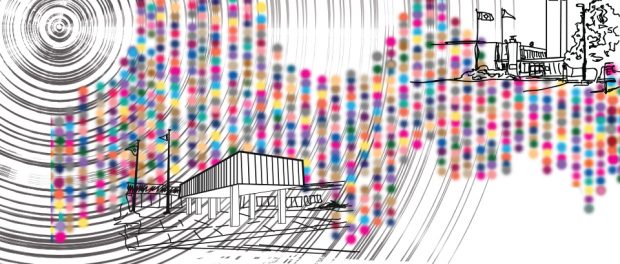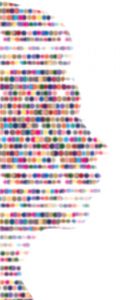Saving provincial schools for the Deaf
Perspectives from two teachers

 I first went to Robarts School for the Deaf when it first opened in 1974 for Grade 8. I had attended EC Drury School for the Deaf before I transferred. Attending Provincial Schools Branch (PSB) schools for the Deaf has made me the person I am. The schools instilled a confidence in me that I could do or be anything I wanted, I still carry that confidence today. The opportunities and experience I was provided are vast and numerous.
I first went to Robarts School for the Deaf when it first opened in 1974 for Grade 8. I had attended EC Drury School for the Deaf before I transferred. Attending Provincial Schools Branch (PSB) schools for the Deaf has made me the person I am. The schools instilled a confidence in me that I could do or be anything I wanted, I still carry that confidence today. The opportunities and experience I was provided are vast and numerous.
I was able to be a part of many athletic teams: swimming, synchronised swimming, track and field, basketball, gymnastics and volleyball. I was actually the one Deaf student on an all-hearing synchronised swim team. Four of us from Robarts had been invited to tryout with a local team. I made it on the team and worked with my hearing peers. Our volleyball team would compete against the local schools in tournaments. I remember one tournament that we were invited to where the host school had a Triple-A volleyball team. We faced them and won! We couldn’t believe it and I don’t think anyone else did. The headlines in the papers that week were, “Robarts school upsets Saunders.” The experience gained while competing for Robarts was immense. It gave me the confidence of going on and competing for Canada at the Deaf Olympics. Competing also gave me the opportunity to meet and socialise with my hearing peers. I made friends with members of the opposing teams. We hung out together and attended each others’ parties.
Our school offered a variety of clubs. I was a part of the photography, diving and drama clubs. It was just like any other school in the area. The opportunities were there for us to gain experience and had the social aspect of school with people who shared the same language. I was a part of our school parliament where I took on a number of roles from rep all the way to president. I had the opportunities to work with other students. I was able to tutor students who may have been having difficulties. I was always trying to help other students. I believe these experiences led me to my chosen field, a teacher and guidance counsellor at EC Drury School for the Deaf.
Academically I was challenged as a student. We were taught what our hearing peers were being taught in the local schools. My teachers constantly encouraged me and always had high expectations. In my final year of high school I was taking a leadership course. Part of that course was a work experience component. I was able to see if teaching was what I wanted by teaching gym in the Elementary school. I was accepted to Gallaudet University in Washington DC and went on to become a teacher. At Gallaudet were not seen as “less than” or “unable to,” we were seen as capable adolescences who happened to be Deaf.
The only way I was able to become the person I am today is because I went to a PSB school for the Deaf. I was in an environment where I could be a part of every aspect of high school life. Robarts School for the Deaf was where I was normal, where we all used the same language. I was never forgotten or let out because of communication. There were no barriers. I was able to have a rich high school life as any other student should have.
If I had gone to a local school I would not have had full access to my education or information. I would not have had the many opportunities for athletics and clubs. I may have been able to be a part of student parliament but not at the capacity of the president. I would have been isolated, just me and my interpreter, without the freedom to just chat with my peers or join a conversation I overhear. An interpreter wouldn’t be there for all the normal little incidental moments in high school which are a big part of the whole high school experience. My teachers would have most likely seen me as “the poor deaf child.” I would not have been challenged or giving the opportunities I had at Robarts School for the Deaf. I have talked to other Deaf people who were mainstreamed. They have told me about their experiences and it is heartbreaking—the isolation and rejection that they faced. I am who I am because of attending a PSB school for the Deaf. Without Robarts School for the Deaf I honestly can’t imagine how my life would have ended up.
 As a hearing person who has been a teacher of the Deaf for over a decade, I think I have learned a thing or two about Deaf education and Deaf culture. Some of this occurred during the York University Deaf Education Diploma program and the American Sign Language (ASL) classes from the Canadian Hearing Society (CHS), but the vast majority of this knowledge comes from experiential learning from colleagues and students.
As a hearing person who has been a teacher of the Deaf for over a decade, I think I have learned a thing or two about Deaf education and Deaf culture. Some of this occurred during the York University Deaf Education Diploma program and the American Sign Language (ASL) classes from the Canadian Hearing Society (CHS), but the vast majority of this knowledge comes from experiential learning from colleagues and students.
This is a critical time in Ontario’s Deaf Education history as bureaucrats who do not share my insight or experience verge on a cultural genocide of Deaf communities. Deaf culture thrives within the schools for the Deaf; that same culture and language suffers greatly within mainstream schools. As a hearing person immersed in Deaf culture I have to be grateful for being welcomed into this world.
People often share stories about their travels. They will detail the food, music, landscape and so forth. Sometimes the happy traveller exclaims how they were welcomed into a new community, acquired some culture, and usually they suggest I should go there too I suppose I could report the same is true of my journey into the Deaf world.
I was an alien in the Deaf world in 2004, unfamiliar with their language, history, politics, or culture. Added to that, I was ignorant of their generational struggles; I knew little about their yearning for autonomy and self-determination. Now in 2016, it seems like all that history is coming to life with the scrutiny provincial schools are currently under.
The erroneous assumptions I made about the Deaf resulted in many misunderstandings and miscommunications. I came to realize that I was working within my own social constructs which did not parallel the Deaf in any way. Although I did not board an airplane, I travelled into the Deaf world. In fact I was transitioning between the Deaf and hearing world daily, something that would become seamless for me, but something that will always be very difficult, challenging, and full of obstacles for Deaf persons.
Over time my daily headaches from working in ASL subsided. With the help of many patient Deaf colleagues I was able to better understand my students and Deaf colleagues, many of which are now friends. My key learnings about Deaf education are summarized as follows:
1 The Deaf have been oppressed by hearing people for generations, only recently have they gained a measure of autonomy and had their input considered in determining the education of their children;
2 Most Deaf don’t read lips, it’s a very rare talent and too often assumed by hearing people to be commonplace;
3 ASL is a rich language and a language of instruction that is a right for the Deaf under Ontario law;
4 The Bilingual-Bicultural approach in provincial schools rose out of 150 years of Deaf education experience and studies. It is the best mode for teaching children who are Deaf and Hard of Hearing;
5 Deaf children in the mainstream are socially isolated and suffer greatly in such settings;
6 A Deaf dance party is a lot louder that you might assume. Their stereo always goes to eleven; you need it that loud to shake the building.
In 2002 and 2003 I was a teacher at Centennial Secondary School in Belleville. During that time I had the opportunity to coach a few students from the Provincial School for the Deaf, Sir James Whitney, which was just a stone’s throw away. I would later come to know that the school in Belleville was the original Ontario School for the Deaf, founded in 1870. The school has a long history of teaching the Deaf and in stature parallels the architecture and style of the provincial parliament buildings and old city hall courts. In the year 2004 I changed my course in life and ended up at EC Drury High School in the Halton board, that was attached to the EC Drury School for the Deaf. It seems like no matter what I did, the Deaf theme was in the picture. I accepted a position with the Provincial School in 2005. Since that time I have learned a great deal about Deaf culture, communicating with the Deaf, living with Deaf people, and being able to call them friends.
Having lived and worked in Europe, I would like to think I know something about culture shock, but really nothing can prepare you for immersing yourself in a Deaf community. When I was hired the need for teachers was so great that I was given an interpreter for a year with the expectation I would acquire ASL and be able to teach on my own the following year. Taking those classes in ASL and teaching in a language I was learning resulted in a headache each evening for about six months. In retrospect I realize how fortunate I was to have some awesome teachers myself, Ron Hall is a lifetime member of OSSTF/FEESO’s District 30, Provincial Schools Authority Teachers (PSAT) and was also one of my first ASL instructors. Ron demonstrated great patience in sharing his language with me and the importance of ASL in instructing Deaf children. Ron had a great sense of humour which I think helped me persevere through the headaches that were a daily ritual. Learning a language is stressful, being a “hearie” in a Deaf world is also stressful, but gaining acceptance and making a difference makes it all worthwhile.
I find it astounding that a person can be considered a teacher of the Deaf and be unable to communicate in ASL, but apparently the qualification is achievable without ASL proficiency. It has been an incredible journey, one that I’m more than happy to talk about at length with anyone that will listen. I now find myself 12 years from retirement and the president of District 30, representing a host of Deaf and hearing teachers, proud to do so, particularly at a time when the future of provincial schools for the Deaf is uncertain, as is that retirement.

If a deaf student only learns sign language, and not lip reading, he/she is limited in how to communicate with the public in general. There aren’t many hearing people who know sign language. This only isolates the deaf student. Lip reading opens many doors and gives the student a feeling of independence.